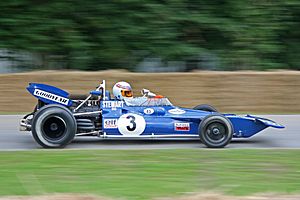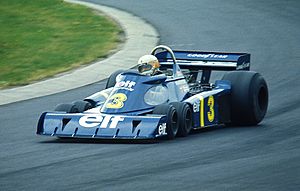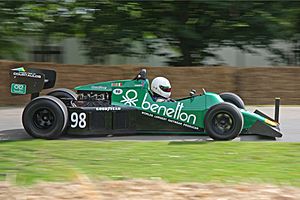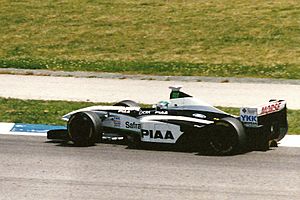Tyrrell Racing facts for kids
 |
|
| Full name | Tyrrell Racing Organisation |
|---|---|
| Base | Ockham, Surrey, United Kingdom |
| Founder(s) | Ken Tyrrell |
| Noted staff | Derek Gardner Mike Gascoyne Tim Densham Harvey Postlethwaite |
| Noted drivers | |
| Next name | British American Racing |
| Constructors = Matra
March
Tyrrell | Debut = 1968 South African Grand Prix (as Matra International)
1970 South African Grand Prix (as Tyrrell Racing Organisation) | Races = 23 entries (23 starts) (as Matra International)
442 entries (440 starts) (as Tyrrell Racing Organisation) | Cons_champ = 1 (1971) (as Tyrrell Racing Organisation) | Drivers_champ = 3 (1969 as Matra International, 1971, 1973 as Tyrrell Racing Organisation) | Wins = 9 (as Matra International)
24 (as Tyrrell Racing Organisation) | Poles = 2 (as Matra International)
17 (as Tyrrell Racing Organisation) | Fastest_laps = 9 (as Matra International)
18 (as Tyrrell Racing Organisation) | Last race = 1969 Mexican Grand Prix (as Matra International)
1998 Japanese Grand Prix (as Tyrrell Racing Organisation) }}
| Formula One World Championship career | |
|---|---|
| Entrants | Tyrrell Racing, several minor teams and privateers |
| First entry | 1970 Canadian Grand Prix |
| Last entry | 1998 Japanese Grand Prix |
| Races entered | 432 entries (430 starts) |
| Race victories | 23 |
| Constructors' Championships | 1 (1971) |
| Drivers' Championships |
2 (1971, 1973) |
| Pole positions | 14 |
| Fastest laps | 20 |
The Tyrrell Racing Organisation was a famous Formula One racing team. It was started by Ken Tyrrell (1924–2001). The team began racing in 1958 and started building its own cars in 1970.
Tyrrell Racing had its biggest success in the early 1970s. They won three Drivers' Championships and one Constructors' Championship with the legendary driver Jackie Stewart. The team continued to win races through the 1970s and early 1980s. Their last win was in 1983.
The team was sold in 1997 to British American Tobacco. It raced its final season as Tyrrell in 1998. Today, the Mercedes-AMG F1 team is a descendant of Tyrrell. This is through several sales and name changes over the years.
Contents
Early Racing Years (1958–1967)
Tyrrell Racing began in 1958. They raced Formula Three cars with Ken Tyrrell as a driver. Ken soon realized he was better at managing a team. In 1959, he stopped driving.
He started a Formula Junior team. Their workshop was a simple woodshed. Throughout the 1960s, Tyrrell moved up through different racing levels. He helped famous drivers like John Surtees and Jacky Ickx start their careers.
The team formed a strong partnership with Jackie Stewart. He first joined them in 1963. Tyrrell also managed the BRM Formula Two team from 1965 to 1967. Stewart was part of BRM's Formula One team during this time.
Later, Tyrrell made a deal to race F2 cars from the French company Matra. Tyrrell first entered a World Championship Grand Prix in 1966. They used F2-spec Matra MS5s for Ickx and Hubert Hahne. Ickx had a crash, and Hahne finished 9th. Tyrrell entered another F2 car for Ickx in 1967. Ickx qualified well but had to start from the back. He retired from the race due to a broken suspension.
Formula One Era (1968–1998)
Starting in the 1960s
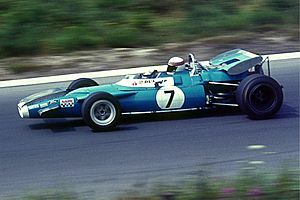
With support from Elf and Ford, Ken Tyrrell achieved his dream. He moved into Formula One in 1968. His team was officially called Matra International. This was a partnership between Tyrrell's team and the French car maker Matra.
Jackie Stewart was a strong competitor. He won three Grand Prix races in the Tyrrell-run Matra MS10. This car had a special feature: its fuel tanks were part of the car's structure. This made the car lighter and stronger. However, the FIA (the racing rule-makers) thought this was unsafe. They banned it for 1970, requiring cars to use rubber fuel bags.
For the 1969 championship, Matra decided to focus only on Ken Tyrrell's team. They built a new car, the Matra MS80. It used a Cosworth DFV engine and still had the structural fuel tanks. Stewart easily won the 1969 title with this car. This was the first time a French car won the championship. It was also the only time a car built in France and entered by a private team won. It was a huge success for both the British team and the French car builder.
The 1970s: New Cars and Challenges
In 1970, Matra merged with Simca. Matra asked Tyrrell to use their V12 engine instead of the Cosworth. Simca was owned by Chrysler, a rival of Ford. Stewart tested the Matra V12 and found it wasn't as good as the Cosworth DFV.
Since Ford provided a lot of Tyrrell's money, Ken Tyrrell had to make a change. He bought a March 701 car to use temporarily. Meanwhile, he secretly developed his own car. Because of this, his team's name changed from Matra International to Tyrrell Racing Organisation in 1970.
Tyrrell kept its sponsorship from the French fuel company Elf. The cars often raced in traditional French blue colors. Tyrrell and Stewart raced the March-Fords in 1970. At the same time, Derek Gardner designed Tyrrell's first in-house Grand Prix car. He worked on it in the woodshed in Ockham, Surrey.
The Tyrrell 001 car looked a lot like the Matra MS80. It appeared at the end of the 1970 season. Stewart achieved a pole position in its first race. This made Tyrrell one of the few teams to get a pole position in their very first race. However, the car had mechanical problems in all three of its races.
The very similar Tyrrell 003 car won both the Drivers' and Constructors' Championships in 1971. This was thanks to strong driving from Jackie Stewart and François Cevert. Stewart's 1972 season was affected by a stomach ulcer. But he returned strong in 1973. He and Cevert finished first and fourth in the championship.
Sadly, Cevert died in a practice crash at the US Grand Prix. Stewart, who planned to retire after that season, and Tyrrell immediately pulled out of the race. This meant they effectively gave the Constructors' title to Lotus. Without their star driver and his talented teammate, Tyrrell never seriously competed for the World Championship again.
Despite this, the team remained strong in the 1970s. They won races with drivers like Jody Scheckter and Patrick Depailler. One famous win was Scheckter's victory in 1976. He drove the unique Tyrrell P34 car, which had six wheels! The P34 was the first and only successful six-wheeled F1 car. It used smaller front wheels, two on each side. This design was stopped because Goodyear, the tire company, wouldn't develop the special small tires needed.
In 1979, Ken Tyrrell found a sponsor: Candy, an Italian company. They helped fund the Tyrrell 009 car.
The 1980s: Challenges and Controversy
In 1977, turbo engines started to appear in Grand Prix racing. By the mid-1980s, these powerful engines made older, non-turbo cars less competitive. Tyrrell often lacked enough money for sponsorship. They were the last team to use the older Cosworth DFV engine.
It was fitting that the last win for the classic Cosworth Ford DFV engine was by a Tyrrell car. Michele Alboreto drove the Tyrrell 011 to victory at the 1983 Detroit Grand Prix. This was also Tyrrell's last Grand Prix win.
1984 Season Controversy
Formula One rules set a minimum weight for cars. In 1984, Tyrrell was the only team using a non-turbo engine. They used a system that added water to the engine to help it run better. The rules also said cars had to be weighed with all their fluids.
During some races, after Tyrrell's final pit stop, small lead pellets were seen coming from the car. It was discovered that Tyrrell was running the car lighter during the race. Then, near the end, they would add water mixed with lead pellets to reach the minimum weight.
After the 1984 Detroit Grand Prix, where Martin Brundle finished second for Tyrrell, the cars were checked. Tyrrell was accused of several rule violations. These included adding extra fuel during the race (which was illegal then) and using illegal fuel. They were also accused of having illegal fuel lines and ballast (the lead shot) that wasn't properly fixed.
Because of these accusations, Tyrrell was removed from the 1984 World Championship. All their points from that year were taken away. Tyrrell appealed this decision. They argued that the "fuel" in the water was very small. They also said the lead shot was fixed inside the water tank. However, the appeal panel still upheld the decision. Tyrrell remained excluded and was banned from the last three races of the season.
This ban meant Tyrrell lost all their points and important travel benefits for the next year. Many people thought this ban was unfair. They believed it was a way for the FIA to remove non-turbo cars from the sport. Tyrrell eventually switched to a turbo Renault engine in 1985. Turbocharged engines became mandatory in 1986.
The 1990s: Final Years
Tyrrell continued to struggle through the 1980s and 1990s. The team often did well despite having less money than bigger teams. They had a brief comeback in the early 1990s.
The team's new car, the Tyrrell 019, designed by Harvey Postlethwaite, was very innovative. With Jean Alesi driving in 1990, the team achieved two second-place finishes. Alesi even led 30 laps of the Phoenix race. Alesi left for Ferrari the next year.
In 1991, with Honda engines and Braun sponsorship, Stefano Modena earned a front-row start at Monaco. He also finished second at the 1991 Canadian Grand Prix. However, the team slowly fell back in performance. Tyrrell's last Formula One points were scored by Mika Salo at the 1997 Monaco Grand Prix.
Eventually, Ken Tyrrell sold his team after the 1997 season. He was facing declining team performance and his own health issues. He sold it to Craig Pollock, who was starting a new team called British American Racing. Ken left the team before the 1998 season. This was after a disagreement about choosing a driver for sponsorship money.
Tyrrell's final race was the 1998 Japanese Grand Prix. One driver, Ricardo Rosset, failed to qualify. His teammate, Toranosuke Takagi, retired from the race after a collision.
Tyrrell's Legacy in F1
The Brawn GP team, which won championships in 2009, and the current Mercedes team are connected to Tyrrell. They are descendants through teams like Honda Racing F1 and BAR. While BAR bought the Tyrrell F1 team, they used a different factory and cars. Most of the old Tyrrell cars and equipment were sold to Paul Stoddart, who later owned the Minardi F1 team.
When team boss Ross Brawn bought the Honda F1 team in 2009, they briefly thought about bringing back the Tyrrell name for the new team.
As of July 2025, the teams that came from Tyrrell have won 8 Drivers' championships and 9 Constructors' championships. This includes Brawn's wins in 2009 and Mercedes' wins from 2014 to 2021.
The Minardi 2-seater F1 cars are based on the 1998 Tyrrell 026 design. You can still see them in demonstrations today. The Tyrrell P34 six-wheeler car is considered one of the most unique and creative race cars ever made. Other teams, like March and Williams, also tried to use a six-wheel design.
Ken Tyrrell passed away from cancer on August 25, 2001, at the age of 77.
Racecars
| Year | Car | Image | Category |
|---|---|---|---|
| 1970 | Tyrrell 001 | 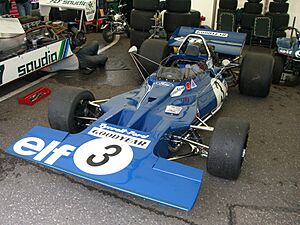 |
Formula One |
| 1971 | Tyrrell 002 |  |
Formula One |
| Tyrrell 003 | 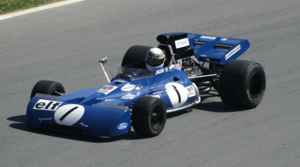 |
Formula One | |
| 1972 | Tyrrell 004 | 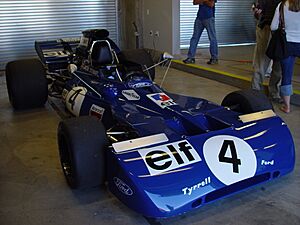 |
Formula One |
| Tyrrell 005 | 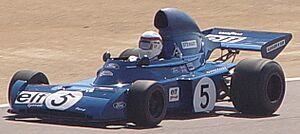 |
Formula One | |
| Tyrrell 006 | 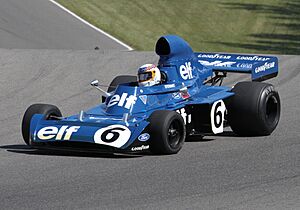 |
Formula One | |
| 1974 | Tyrrell 007 | 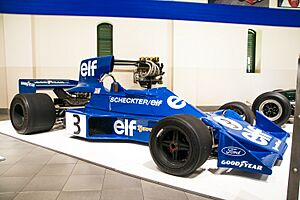 |
Formula One |
| 1976 | Tyrrell P34 | 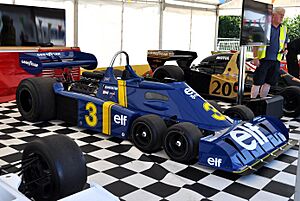 |
Formula One |
| 1977 | Tyrrell P34B | 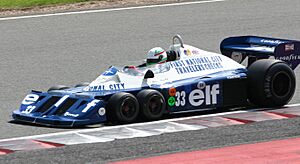 |
Formula One |
| 1978 | Tyrrell 008 | 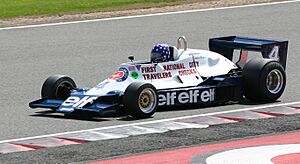 |
Formula One |
| 1980 | Tyrrell 009 | 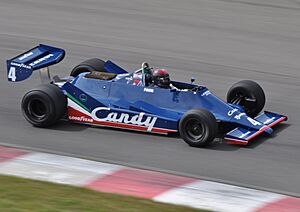 |
Formula One |
| 1981 | Tyrrell 010 | 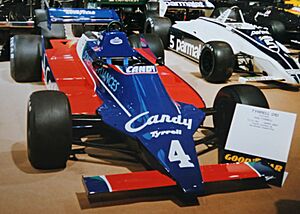 |
Formula One |
| Tyrrell 011 | 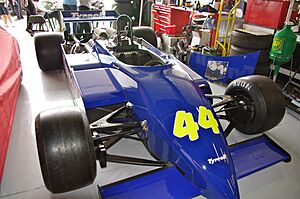 |
Formula One | |
| 1983 | Tyrrell 012 | 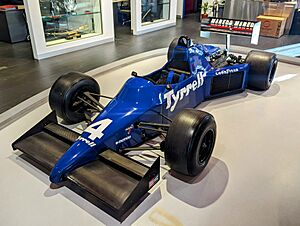 |
Formula One |
| 1985 | Tyrrell 014 | 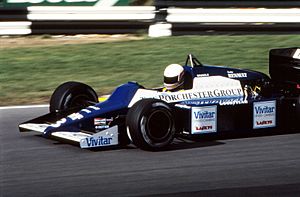 |
Formula One |
| 1986 | Tyrrell 015 | 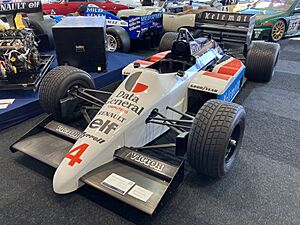 |
Formula One |
| 1987 | Tyrrell DG016 |  |
Formula One |
| 1988 | Tyrrell 017 | 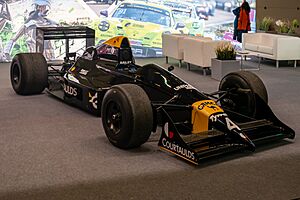 |
Formula One |
| 1989 | Tyrrell 017B | Formula One | |
| Tyrrell 018 | 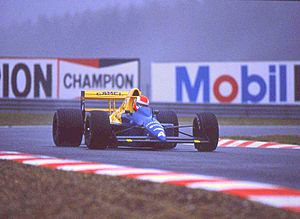 |
Formula One | |
| 1990 | Tyrrell 019 | 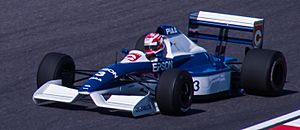 |
Formula One |
| 1991 | Tyrrell 020 | 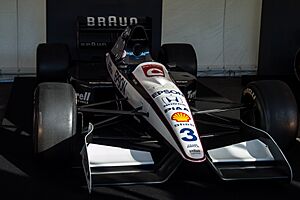 |
Formula One |
| 1992 | Tyrrell 020B | 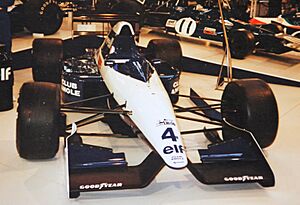 |
Formula One |
| 1993 | Tyrrell 020C | 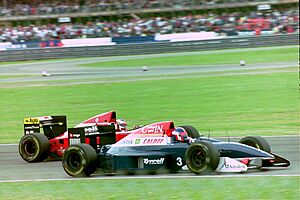 |
Formula One |
| Tyrrell 021 | 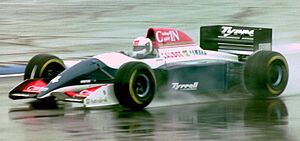 |
Formula One | |
| 1994 | Tyrrell 022 | 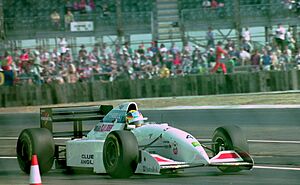 |
Formula One |
| 1995 | Tyrrell 023 | 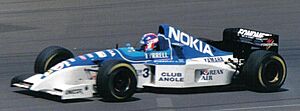 |
Formula One |
| 1996 | Tyrrell 024 | 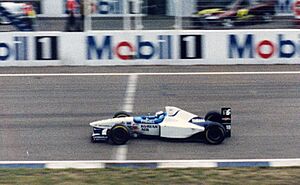 |
Formula One |
| 1997 | Tyrrell 025 | 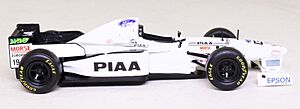 |
Formula One |
| 1998 | Tyrrell 026 | 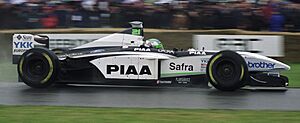 |
Formula One |
Formula One World Championship Results
| Formula One results | ||||||||
|---|---|---|---|---|---|---|---|---|
| (Bold indicates championships won.) | ||||||||
| Year | Name | Car | Engine | Tyres | Drivers | Points | WCC | |
| 1966 | MS5 | Cosworth SCA 1.0 L4 BRM P80 1.0 L4 |
D | N/A | N/A | |||
| 1967 | MS5 | Cosworth FVA 1.6 L4 | D
|
N/A | N/A | |||
| 1968 | MS9 MS10 |
Cosworth DFV 3.0 V8 | D | N/A | N/A | |||
| 1969 | MS10 MS80 MS84 MS7 |
Cosworth DFV 3.0 V8 Cosworth FVA 1.6 L4 |
D | N/A | N/A | |||
| 1970 | March 701 Tyrrell 001 |
Cosworth DFV 3.0 V8 | D | 0 | NC | |||
| 1971 | 001 002 003 |
Cosworth DFV 3.0 V8 | G | 73 | 1st | |||
| 1972 | 002 003 004 005 006 |
Cosworth DFV 3.0 V8 | G | 51 | 2nd | |||
| 1973 | 005 006 |
Cosworth DFV 3.0 V8 | G | 82 | 2nd | |||
| 1974 | 005 006 007 |
Cosworth DFV 3.0 V8 | G | 52 | 3rd | |||
| 1975 | 007 | Cosworth DFV 3.0 V8 | G | 25 | 5th | |||
| 1976 | 007 P34 |
Cosworth DFV 3.0 V8 | G | 71 | 3rd | |||
| 1977 | P34 | Cosworth DFV 3.0 V8 | G | 27 | 5th | |||
| 1978 | 008 | Cosworth DFV 3.0 V8 | G | 38 | 4th | |||
| 1979 | 009 | Cosworth DFV 3.0 V8 | G | 28 | 5th | |||
| 1980 | 009 010 |
Cosworth DFV 3.0 V8 | G | 12 | 6th | |||
| 1981 | 010 011 |
Cosworth DFV 3.0 V8 | M | 10 | 8th | |||
| 1982 | 011 | Cosworth DFV 3.0 V8 | G | 25 | 7th | |||
| 1983 | 011 012 |
Cosworth DFV 3.0 V8 | G | 12 | 7th | |||
| 1984 | 012 | Cosworth DFY 3.0 V8 | G | 0 | DSQ | |||
| 1985 | 012 014 |
Cosworth DFY 3.0 V8 Renault EF4B 1.5 V6 t |
G | 4 (Tyrrell-Cosworth) 3 (Tyrrell-Renault) |
9th (Tyrrell-Cosworth) 10th (Tyrrell-Renault) |
|||
| 1986 | 014 015 |
Renault EF4B 1.5 V6 t | G | 11 | 7th | |||
| 1987 | DG016 | Ford Cosworth DFZ 3.5 V8 | G | 11 | 6th | |||
| 1988 | 017 | Ford Cosworth DFZ 3.5 V8 | G | 5 | 8th | |||
| 1989 | 017B 018 |
Ford Cosworth DFR 3.5 V8 | G | 16 | 5th | |||
| 1990 | 018 019 |
Ford Cosworth DFR 3.5 V8 | P | 16 | 5th | |||
| 1991 | 020 | Honda RA101E 3.5 V10 | P | 12 | 6th | |||
| 1992 | 020B | Ilmor 2175A 3.5 V10 | G | 8 | 6th | |||
| 1993 | 020B 021 |
Yamaha OX10A 3.5 V10 | G | 0 | NC | |||
| 1994 | 022 | Yamaha OX10B 3.5 V10 | G | 13 | 7th | |||
| 1995 | 023 | Yamaha OX10C 3.5 V10 | G | 5 | 8th | |||
| 1996 | 024 | Yamaha OX11A 3.5 V10 | G | 5 | 8th | |||
| 1997 | 025 | Ford ED4 3.0 V8 Ford ED5 3.0 V8 |
G | 2 | 10th | |||
| 1998 | 026 | Ford JD Zetec-R 3.0 V10 | G | 0 | NC | |||
See also
 In Spanish: Tyrrell Racing para niños
In Spanish: Tyrrell Racing para niños
 | Delilah Pierce |
 | Gordon Parks |
 | Augusta Savage |
 | Charles Ethan Porter |


